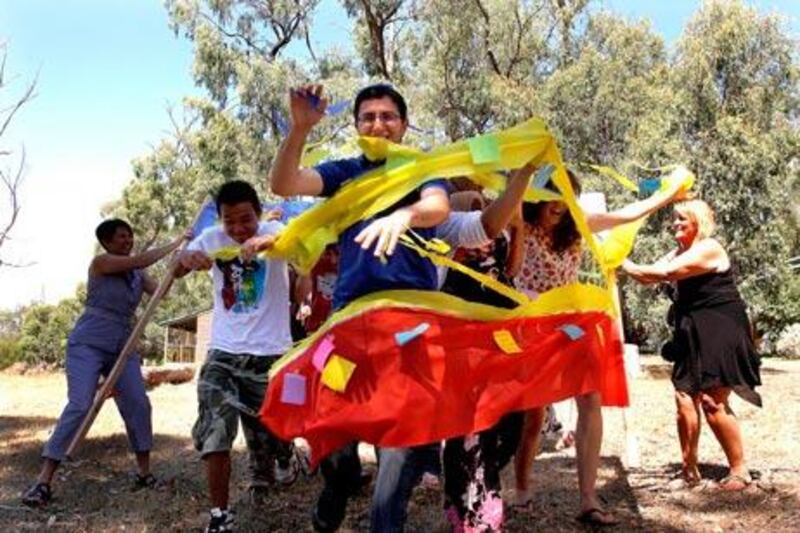MELBOURNE // A bold project to bring together a new generation of leaders from Australia's diverse Muslim, Christian and Jewish communities has been held at a rural retreat near Melbourne. It is in an effort to dismantle stereotypes and promote greater understanding at a time when both domestic and international pressures have strained relations between religious groups. The Multifaith Future Leaders Programme is the work of the B'nai B'rith Anti-Defamation Commission, a Jewish organisation based in the southern state of Victoria, which invited more than 30 young professionals and students to a three-day seminar at an outdoor activity centre on the outskirts of the historic town of Kyneton.
Organisers said this was the first course of its kind in Australia aimed specifically at the 18-to-26 age bracket, where Catholics, Baptists and other Christians have shared their ideas and fears with orthodox and non-orthodox Jews along with young Muslims from a range of countries. "From the Muslim community we didn't want 10 people who have come from the Arab Middle East, so what we got is a couple from South-east Asia, Africa as well as the Middle East.
"So, we're getting a real broad representation of the Muslim community," said the executive officer of the B'nai B'rith Anti-Defamation Commission, Ari Morris, whose grandmother survived being imprisoned as a child at the Nazi Auschwitz concentration camp. "Not getting on is a potential recipe for disaster and a lack of dialogue can lead to discord, disagreement and worse. We all know that. "One might have feared that the participants might have sat in their own groups but, no, it is enlightening to see over dinner them breaking down those barriers and to talk about music, sport, food or whatever. It's nice to see."
There was also a deep conviction that those who aspire to be standard bearers of their faith in the future should adopt a more inclusive attitude to different religions than their predecessors. "I think the younger generation seems to be more civilised," said Lukman Arbi, 19, from Indonesia, who is studying commerce in Melbourne." Their parents came here to make a living but it's the burden of the young to carry on the will of their parents, get an education and live smarter and better than their parents and in the process be able to work between the faiths."
Eroding age-old suspicions and replacing misgivings with trust will inevitably take time, according to another participant, Heba Ibrahim, a board member of the Islamic Council of Victoria. He said: "In Australia, although we're a secular society, the only religion recognised is Christianity. It's celebrated in public schools and everywhere else. "People do not know about the other faiths around them. That's the problem.
"People are not brought up to understand what their neighbour's beliefs might be." Vilified and abused after the terrorist attacks of September 11 and the Bali bombings a year later, Australia's 350,000-strong Muslim minority has often felt demonised in a country that prides itself on a generous multicultural spirit but where bigotry and antagonism lurk beneath the surface. Mr Ibrahim believes, though, that a dismal situation has been slowly changing and negative stereotypes of Muslims gradually diminished thanks to youthful vitality.
"The Muslim community [in Australia] is a young community. Fifty per cent of us are under the age of 25. "So, we've come from being a non-established community where we didn't have halal food or Islamic gatherings to one where we've got young people who are going to university, educating themselves, getting into all sorts of fields and every Muslim as they grow up are giving something back to the society. As we get older, the more we learn, the more organised we are and the more established we get."
The residential course - set amid the leafy expanses of a country estate where cream-coloured cabins sit at the end of cinder pathways that cut through eucalyptus forests - has provided a tranquil forum for some heavyweight discussion. "Gaza has been mentioned among the participants but the way in which people hold themselves and engage with one another has been particularly mature," said Caroline Mense, a young Jewish woman studying law at Melbourne's Deakin University.
The Christian student Yalenka Clement, 21, said despite a general sense of goodwill there had been some testy moments. "We were having a big discussion about September 11 and one of the girls got quite defensive because she felt she had to apologise on behalf of the Muslim community," she said. "I haven't had that many close Muslim friends and it's good to come here though and mix more with Muslims and get a better understanding of them."
The event's overall spirit of acceptance was perhaps best highlighted when the group ran through a large banner bearing words of tolerance and unity - a tradition usually reserved for sporting teams as they take to the field in Australian Rules Football. "We're here to build trust and look at ways to develop as young Australians," Mr Morris said. pmercer@thenational.ae





